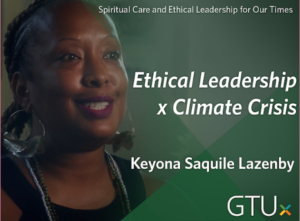Mother Earth suffers from the tentacles of white supremacy. For centuries, white supremacist ideology and practices led to the creation of the Transatlantic Slave trade, global genocides, colonization, imperialism, environmental racism, and ecocide, to name a few. Ecological crises ravage Mother Earth from raging fires, climate change, ocean pollution, and animal extinction. These manufactured ecological crises stem from a disruption in our ecosystem and humans’ destructive relationship with Mother Earth. Environmental Justice activists rang the alarm to warn governments and people how climate change harms Mother Earth, and the devastation was on the horizon. The environmental justice movement evolved as a direct response to how white supremacist capitalism systems harm Mother Earth, humans, and non-human species through greed, consumption, and destruction. It sought to repair, restore, and rejuvenate Mother Earth and its inhabitants through policy, organizing, and direct action. Though all humans and non-humans experience the effects of environmental harm, the global majority (people of color) communities suffer significantly from environmental injustices, including respiratory ailments, reproductive challenges, housing inequities, and mass incarceration. To combat these challenges, global majority communities sought solutions that resemble connections to their homelands. In Religion and Sustainability: Interreligious Resources and Interdisciplinary Responses, Womanist Ethicist Dr. Valerie Miles-Tribble utilized late author Toni Morrison’s famed novel, Beloved, to illustrate Black women’s sacred relationship with nature; she stated in “Baby Suggs and the Clearing Rocks of Ages: Womanist Theoethic of Survival Justice” essay, “Vivid in the hush arbor rendering is the overarching presence of nature as living spirit grasped as Mother Earth and understood to be crucial to the quest for human survival.” During slavery, the hush arbor served as a sacred gathering place where enslaved Africans practiced their religious and spiritual traditions that provided solace and invoked hope to survive. A hope narrative, ecowomanism offers an interdisciplinary approach to race, class, gender, and earth justice that draws on specific principles and practices of African Cosmological Traditions on addressing ecological crises and seeking to reduce the harm to Mother Earth.
Utilizing an ecowomanism praxis, Ifá Isese, a West African Cosmological Tradition, fosters and cultivates the interconnected and interdependent relationship between Mother Earth, the environment, nature, elements, and all species. The principles of honor, respect, and reverence guide Ifá Isese practitioners’ interaction with human and non-human species. In her groundbreaking book, Ecowomanism- African-American Women and Earth-Honoring Faiths, Ecowomanist Dr. Melanie L. Harris states that the writings of prominent author Mercy Oduyoye “help connect the fluid spirituality between Christian orientation and cultural ancestor veneration of the Earth as sacred. Partnering with God to transform climate justice into a reality is an element of her work witnessed by her ecowomanist practice and scholarship. “ Ecowomanism builds a bridge between eco memory, sharing dialogue, womanist intersectional analysis, engaged transformation, and teaching ecowomanism that provides a step-by-step process that religious and spiritual communities could borrow to support their engagement in dismantling white supremacist systems that dishonor Mother Earth.
Rev. Keyona Saquile Lazenby is a PhD student at the GTU in the Religion and Practice department, with a concentration in Practical Theology. You can watch her Spiritual Care and Ethical Leadership lecture “Ethical Leadership x Climate Crisis” on GTUx here.

